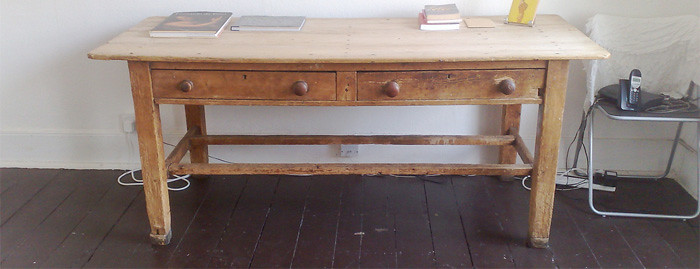
A couple of weeks ago, a group of friends and acquaintances converged on Arkwright’s Mill in the Derwent Valley for an event called Laptops & Looms. We were there ostensibly to talk about the new Making, small-scale manufacture, reindustrialisation, and how we take the webby, start-up, DIY approach to physical things. Matt Edgar has a good write-up, and there are various follow-ups floating around. I wanted to throw something in.
A huge number of attendees mentioned what their parents or antecedents did, and most of them were engineers or in associated trades. Russell’s Dad worked at Boeing in Derby. Matt Cottam’s grandparents moved to Rhode Island to work in textile mills, where he later attended the Rhode Island School of Design, and now found himself in the first textile mill talking about industry again. And there are our own formative influences too: Tom and I joke regularly about just how many of our circle did the lighting for the school plays.
My Grandads were an engineer and a fireman. Both my parents had, ultimately, highly independent careers. My Mum trained people in communication, travelled a lot, worked flexibly. She could pick and choose when and how she worked. My Dad worked in the Whisky trade for years but when he left and founded his own company 15-odd years ago he named his first business Lochinvar, not just for the Scottish connection, but for Walter Scott’s fourth line: “He rode all unarmed and he rode all alone.” I think I absorbed the desire to work independently fairly early on.
So if a generation of engineers and flexible corporate jobs produced a generation of creative technologists and freelancers, what will the first makers, the early adopters, result in? In short, What Will Arthur Do?
Dan Hill talked about interfacing with the “dark matter” of large organisations to Get Things Done. With respect to governments and corporations, I admit I’m lukewarm about trying to turn oil tankers around: I’ve done enough of that in publishing and haven’t seen many successful examples. More things are supplanted than changed (but more people are living than dead, etc.). And I have no desire to talk to David Cameron. But I am intrigued by what our generation might produce in the next. What will you do if your parent was a UX designer? Or an SEO guru?
And so, I think it’s important that we encourage this. Matt Sheret’s been writing about how we need to speak to those outside our disciplines to spread these ideas. I agree, but I’ve also believed for some time that we need to change the way we talk to kids about them. A world in which you can get your ICT GCSE by becoming proficient in Microsoft Office suite is not one which will produce the next generation of radical makers. Young Hackspace just might.
Or perhaps there’s something else, perhaps making-things and making-bits don’t just cycle back from one to another, perhaps there’s a third place to go to. Only our children will find it, and we probably won’t understand what they do. We don’t need to reindustrialise, but we don’t need to fill the mills with digital services either.
It’s the maker’s manifesto, really. Make the things that we make hackable too. Encourage secondary markets. Educate, educate, educate. We built on the values of our parents; the only thing we can really do is pass these down. Perhaps they hate Facebook for good reason, because they understand more intuitively than we do how limiting and infantilising it is; perhaps they see past the sheen of current-instantiation ebooks and other content technologies to the terrible limitations they are trying to impose on our cultural experiences. Perhaps not, but perhaps we can fix things anyway. Perhaps I do want to change the world, after all.
*
While we’re at it, you also really need to read two pieces connected to the recent Edgelands event in Edinburgh: Rachel’s “On Edgelands” and Tom’s “Technology as a Material”. “Art is a purpose, not an excuse.” Ooh, goosebumps.
Comments are closed. Feel free to email if you have something to say, or leave a trackback from your own site.